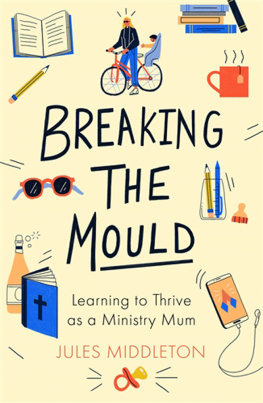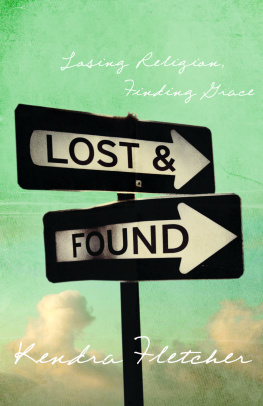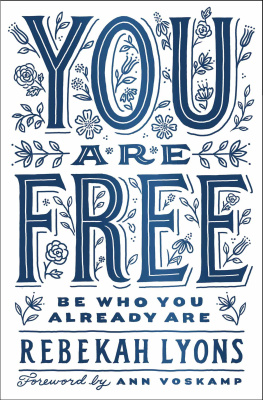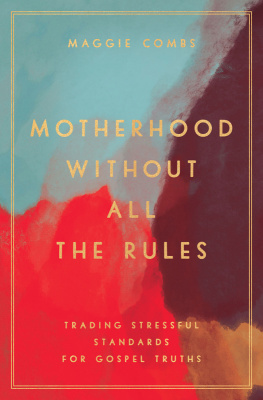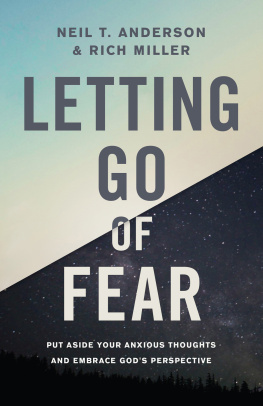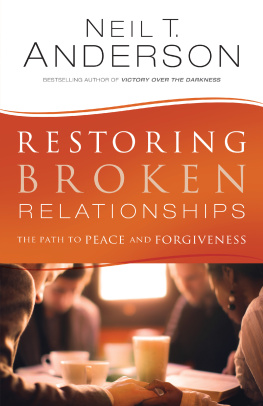4

Whats a Picture Worth?
Our churches are filled with people who look contented and at peace but inwardly are crying out for someone to love them... just as they are... confused, frustrated, often frightened, guilty, and often unable to communicate even within their own families. But the other people in the church look so happy and contented that one seldom has the courage to admit his own deep needs before such a self-sufficient group as the average church meeting appears.
Keith Miller
A while ago, a talented artist friend offered me the great gift of his vulnerability through e-mail. He wasted no time getting to the point. Fil, Im in the midst of a horrible crisis of faith. Then he explained that his church had asked him to exhibit a self-portrait for a special event. Rather than risk its meaning being overlooked or misinterpreted, he also provided a brief written explanation, which drew his pastors ire. Apparently the pastor felt that his disclosure was too honest.
The painting reflected his conviction that theres no room for pretending in a Christians lifeacting like God is in control when you dont believe that he is, giving the impression that everything is all right in your life when its not. His particular concern was with religious people changing their appearance when among other religious people in order to fit in or to be accepted as holy. We are told that Jesus loves us as we are, sin and all, ugly bits and worthless bits. We are quoted clichs like, Come as you are. We are offered relief from the burden of hiding in our guilt and shame. We are offered ultimate acceptance.
The problem begins, from my friends perspective, when we step through the doors of many churches. Suddenly were confronted with an endless stream of things that are wrong in our lives, things to repent of, things that need changing. Meanwhile, the Bible instructs us, Make this your common practice: Confess your sins to each other and pray for each other so that you can live together whole and healed (James 5:16). Yet nobody does it, because that would mean taking off our mask of holiness. Therefore we live our lives jumping through imaginary hoops in order to be accepted by the very people who invited us to come as you are.
He concluded his remarks with this bold pledge: I refuse to wear a mask any longer! I will not pretend, not even for Christians. Wearing a mask will destroy you, even if its a socially accepted Christian mask.
After reading the letter I opened the file containing his portrait. It was titled A Broken Mask, and I was stunned by its force. Wearing an athletic jersey and baseball cap, he is seated and leaning forward with his elbow resting on his knee. His head is propped up on the backside of his hand. He appears downcast, gloomy and regretful. His eyes are transfixed and pensive as he gazes at a mask which he holds in his other hand. The mask clearly bears his likeness, yet its image tells a different story. The face is soft and serene, yet spirited and winsome. The bright eyes appear clear and hopeful. The mask portrays peace and freedom. Yet its a lie.
For hours I remained at my desk feeling deeply distressed. Why does pretending become the craft of most Christians? When will we be freed from the dread of our fraudulent life being exposed? From the endless ways we painstakingly attempt to convince others of what we cant convince ourselves: that we are valuable? What will it take for us to stop living irrationally behind our frantic falseness that cunningly conceals who we really are? Are we so blind that we cannot see how our pretending drains every ounce of our integrity? Will we die before our denial, displacement and repression turns us into a shell of our true selves?
These haunting questions provoked an onslaught of images of members of Congress, priests, pastors and teachers, some of them friends who have fallen, crushed beneath the weight of their shameful secrets. Before I turned out the lights, locked the door and wearily headed for home Id been reminded that a secret life of pretending never stays secret. Id also wept for myself and all those who have suffered beneath the torturous, crushing weight of fear, guilt and shame that always accompanies pretending. As I plopped down into my seat and began the drive home, I kept wondering, Cant there be another way?
To Know Me Is (Not) to Love Me
Lets stop playing games. Can we finally be truthful, at least with ourselves? If so, let me ask you some questions that have confronted meand my own masks.
Do you ever fear that if those who say they love you were given an opportunity to really know you, they would turn away and withhold their affection? Do you sometimes feel unlovable as the result of repetitive rejection? Have you foolishly or bravely chosen to risk being authentic and been met with the crushing realization that those who know you dont love you? How has this experience deformed your life? Have you then become a slick imposter, skillfully giving the impression that you are the mask you wear? Despite your glittering image, do you live in confusion and fear behind the isolating walls you built for your protection? Have you deluded yourself for so long that pretending has become not only acceptable but necessary? If so, rest assured, you are not alone.
For as far back as I can remember, Ive struggled with raging anger. Going back and forth between despising and denying it, and everything in between, Ive done everything in my power to keep it in check. What I have despised most are the countless times my venomous rage has been grossly out of proportion with the provocation, and most especially when it was directed toward people who are most dear to me. A few years ago I swallowed enough of my pride and mustered up a sufficient amount of courage to visit a therapist for help.
One of the first things my counselor assured me was that anger is a good thing. Thats why, she explained, its all right that Jesus got angry in the temple. Next she helped me realize that just like red, yellow and blue are primary colors, and secondary colors can be made from a mixture of these, anger is not a primary emotion. Anger is a secondary emotion that is almost always a mixture of primary emotions. Our anger can be a messagea signal that something is going on beneath the surface. This is the G.I.F.T. of anger, indicating in all likelihood the presence of guilt, inferiority, fear or trauma in our lives. It offers the possibility of exploring and coming to know ourselves more fully. When we learn to use the gift of anger, we can step more fully into our true self. This is a gift to us and to everyone in our lives.
I returned home feeling relieved and hopeful. I also recall thinking, if guilt, inferiority, fear or trauma are the triggers for anger, its no wonder Im so angry. I was confident that all of these primary emotions were hidden within the dark recesses of my heart. After our next few sessions, I began to note how annoying her repeated questions regarding my childhood had become. Why does she persist with questions about my past, when Ive assured her theres nothing Im intending to hide?
Finally, one afternoon I had tolerated as much of her prying as I could stand. Enraged, I angrily shouted, Ive told you that I have nothing I wish to hide! Why cant you believe me and give it a rest? Immediately I felt stunned and embarrassed by my outburst. I also felt terribly lonely and afraid. Although I had wished to hide nothing, much had been hidden.
Her response was precise and direct. It reflected a genuine kindness and concern. Fil, the gaps between your stories are huge, indicating that there are deeply buried, forgotten and untold segments. I believe the time has come for you to discover more of who you are, apart from the role youve been playing. It took me no time to realize that my outburst was fueled by my own fear of encountering what had been forgotten. Before our session ended she gently posed a simple question: Do you have any pictures from your childhood? Perhaps looking at some old photographs and talking about the memories they invoke would help to resurface some forgotten memories.


